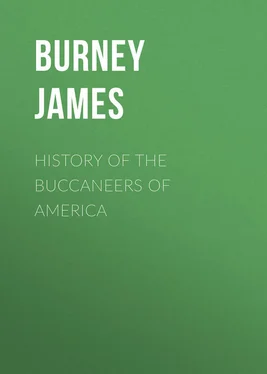James Burney - History of the Buccaneers of America
Здесь есть возможность читать онлайн «James Burney - History of the Buccaneers of America» — ознакомительный отрывок электронной книги совершенно бесплатно, а после прочтения отрывка купить полную версию. В некоторых случаях можно слушать аудио, скачать через торрент в формате fb2 и присутствует краткое содержание. Жанр: foreign_antique, foreign_prose, на английском языке. Описание произведения, (предисловие) а так же отзывы посетителей доступны на портале библиотеки ЛибКат.
- Название:History of the Buccaneers of America
- Автор:
- Жанр:
- Год:неизвестен
- ISBN:нет данных
- Рейтинг книги:4 / 5. Голосов: 1
-
Избранное:Добавить в избранное
- Отзывы:
-
Ваша оценка:
- 80
- 1
- 2
- 3
- 4
- 5
History of the Buccaneers of America: краткое содержание, описание и аннотация
Предлагаем к чтению аннотацию, описание, краткое содержание или предисловие (зависит от того, что написал сам автор книги «History of the Buccaneers of America»). Если вы не нашли необходимую информацию о книге — напишите в комментариях, мы постараемся отыскать её.
History of the Buccaneers of America — читать онлайн ознакомительный отрывок
Ниже представлен текст книги, разбитый по страницам. Система сохранения места последней прочитанной страницы, позволяет с удобством читать онлайн бесплатно книгу «History of the Buccaneers of America», без необходимости каждый раз заново искать на чём Вы остановились. Поставьте закладку, и сможете в любой момент перейти на страницу, на которой закончили чтение.
Интервал:
Закладка:
The English and French in a short time had disagreements, and began to make complaints of each other. The English took possession of the small Island Nevis , which is separated only by a narrow channel from the South end of St. Christopher . P. Charlevoix says, 'the ambition of the English disturbed the good understanding between the colonists of the two nations; but M. de Cusac arriving with a squadron of the French King's ships, by taking and sinking some British ships lying there, brought the English Governor to reason, and to confine himself to the treaty of Partition.' 1629. The English and French driven from Saint Christopher by the Spaniards. After effecting this amicable adjustment, De Cusac sailed from St. Christopher ; and was scarcely clear of the Island when a powerful fleet, consisting of thirty-nine large ships, arrived from Spain , and anchored in the Road. Almost without opposition the Spaniards became masters of the Island, although the English and French, if they had cordially joined, could have mustered a force of twelve hundred men. Intelligence that the Spaniards intended this attack, had been timely received in France ; and M. de Cusac's squadron had in consequence been dispatched to assist in the defence of St. Christopher ; but the Spaniards being slow in their preparations, their fleet did not arrive at the time expected, and De Cusac, hearing no news of them, presumed that they had given up their design against St. Christopher . Without strengthening the joint colony, he gave the English a lesson on moderation, little calculated to incline them to co-operate heartily with the French in defence of the Island, and sailed on a cruise to the Gulf of Mexico . Shortly after his departure, towards the end of the year 1629, the Spanish fleet arrived. The colonists almost immediately despaired of being able to oppose so great a force. Many of the French embarked in their ships in time to effect their escape, and to take refuge among the islands northward. The remainder, with the English, lay at the disposal of the Spanish commander, Don Frederic de Toledo . At this time Spain was at war with England , France , and Holland ; and this armament was designed ultimately to act against the Hollanders in Brasil , but was ordered by the way to drive the English and the French from the Island of Saint Christopher . Don Frederic would not weaken his force by leaving a garrison there, and was in haste to prosecute his voyage to Brasil . As the settlement of Saint Christopher had been established on regular government authorities, the settlers were treated as prisoners of war. To clear the Island in the most speedy manner, Don Frederic took many of the English on board his own fleet, and made as many of the other colonists embark as could be crowded in any vessels which could be found for them. He saw them get under sail, and leave the Island; and from those who remained, he required their parole, that they would depart by the earliest opportunity which should present itself, warning them, at the same time, that if, on his return from Brasil , he found any Englishmen or Frenchmen at Saint Christopher , they should be put to the sword. 1630. They return. After this, he sailed for Brasil . As soon, however, as it was known that the Spanish fleet had left the West-Indian sea, the colonists, both English and French, returned to Saint Christopher , and repossessed themselves of their old quarters.
The settlement of the Island Saint Christopher gave great encouragement to the hunters on the West coast of Hispaniola . Their manufactories for the curing of meat, and for drying the skins, multiplied; and as the value of them increased, they began to think it of consequence to provide for their security. The Island Tortuga seized by the English and French Hunters. To this end they took possession of the small Island Tortuga , near the North-west end of Hispaniola , where the Spaniards had placed a garrison, but which was too small to make opposition. There was a road for shipping, with good anchorage, at Tortuga ; and its separation from the main land of Hispaniola seemed to be a good guarantee from sudden and unexpected attack. They built magazines there, for the lodgement of their goods, and regarded this Island as their head quarters, or place of general rendezvous to which to repair in times of danger. They elected no chief, erected no fortification, set up no authorities, nor fettered themselves by any engagement. All was voluntary; and they were negligently contented at having done so much towards their security.
Whence the Name Buccaneer. About the time of their taking possession of Tortuga , they began to be known by the name of Buccaneers, of which appellation it will be proper to speak at some length.
The flesh of the cattle killed by the hunters, was cured to keep good for use, after a manner learnt from the Caribbe Indians, which was as follows: The meat was laid to be dried upon a wooden grate or hurdle ( grille de bois ) which the Indians called barbecu , placed at a good distance over a slow fire. The meat when cured was called boucan , and the same name was given to the place of their cookery. Père Labat describes Viande boucannée to be, Viande seché a petit feu et a la fumée . The Caribbes are said to have sometimes served their prisoners after this fashion, ' Ils les mangent après les avoir bien boucannée, c'est a dire, rotis bien sec 5 5 Hist. des Antilles, par P. du Tertre. Paris, 1667. Tome I. p. 415.
.' The boucan was a very favourite method of cooking among these Indians. A Caribbe has been known, on returning home from fishing, fatigued and pressed with hunger, to have had the patience to wait the roasting of a fish on a wooden grate fixed two feet above the ground, over a fire so small as sometimes to require the whole day to dress it 6 6 La Rochefort, sur le Repas des Carribes.
.
The flesh of the cattle was in general dried in the smoke, without being salted. The Dictionnaire de Trevoux explains Boucaner to be ' faire sorer sans sel ,' to dry red without salt. But the flesh of wild hogs, and also of the beeves when intended for keeping a length of time, was first salted. The same thing was practised among the Brasilians. It was remarked in one of the earliest visits of the Portuguese to Brasil , that the natives (who were cannibals) kept human flesh salted and smoked, hanging up in their houses 7 7 History of Brasil, by Robert Southey , p. 17.
. The meat cured by the Buccaneers to sell to shipping for sea-store, it is probable was all salted. The process is thus described: 'The bones being taken out, the flesh was cut into convenient pieces and salted, and the next day was taken to the boucan .' Sometimes, to give a peculiar relish to the meat, the skin of the animal was cast into the fire under it. The meat thus cured was of a fine red colour, and of excellent flavour; but in six months after it was boucanned, it had little taste left, except of salt. The boucanned hog's flesh continued good a much longer time than the flesh of the beeves, if kept in dry places.
From adopting the boucan of the Caribbes, the hunters in Hispaniola , the Spaniards excepted, came to be called Boucaniers, but afterwards, according to a pronunciation more in favour with the English, Buccaneers 8 8 In some of the English accounts the name is written Bucanier ; but uniformity in spelling was not much attended to at that time. Dampier wrote Buccaneer , which agrees with the present manner of pronouncing the word, and is to be esteemed the best authority.
. Many of the French hunters were natives of Normandy ; whence it became proverbial in some of the sea-ports of Normandy to say of a smoky house, c'est un vrai Boucan .
Интервал:
Закладка:
Похожие книги на «History of the Buccaneers of America»
Представляем Вашему вниманию похожие книги на «History of the Buccaneers of America» списком для выбора. Мы отобрали схожую по названию и смыслу литературу в надежде предоставить читателям больше вариантов отыскать новые, интересные, ещё непрочитанные произведения.
Обсуждение, отзывы о книге «History of the Buccaneers of America» и просто собственные мнения читателей. Оставьте ваши комментарии, напишите, что Вы думаете о произведении, его смысле или главных героях. Укажите что конкретно понравилось, а что нет, и почему Вы так считаете.












